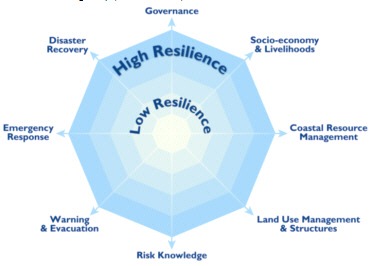ADPC Coastal Community
Resilience (CCR) Initiative



Coastal vulnerabilities
Coastal communities around the world, large
and small, are becoming increasingly
vulnerable to a wide range of coastal
hazards including severe storm events,
tsunamis, shoreline erosion, and coastal
resource degradation. Increased
vulnerability is partly due to the
constantly increasing coastal population. An
estimated 23 percent of the world’s
population (1.2 billion people) and more
than 50 percent of the Indian Ocean region’s
population lives within 100 kilometers of
shoreline and 100 meters of sea level. Most
of the coastal population lives in rural
areas and in small to medium cities, where
basic services and disaster warning and
response mechanisms are limited. Population
density coupled with increasing frequency
and duration of storms, sea level rise, and
other coastal hazards cause the impacts of
disasters to be more severe and recovery to
be slower and less sustainable.
What is Coastal Community Resilience (CCR)?
The Coastal Community Resilience (CCR) is a
focused initiative that promotes tsunami and
other hazard readiness through the active
collaboration of national and local
emergency management agencies, coastal
managers, training institutions, and local
communities. Building on local knowledge and
needs, this effort supports integrated and
more standardized hazard awareness and
mitigation efforts that improve public
safety during emergencies and builds
preparedness against recurring disasters.
While many coastal hazards are beyond the
community’s capacity to control them,
proactive measures can be taken to reduce
vulnerability and provide the enabling
conditions for communities to absorb and
bounce back from disruptions. “Resilient
coastal communities” understand coastal
hazards, take deliberate and coordinated
actions to reduce vulnerability, and have
appropriate and practiced contingency plans
to respond to disaster events.

What is the ADPC facilitated CCR
implementation initiative?
The CCR implementation initiative,
facilitated by ADPC, is a unique
regional-wide arrangement in Indian Ocean
and in various countries in Asia for growing
sensitization, building forum, program
demonstration, capacity building and a wide
range of application to enhance resilience
at local, national and regional level. This
initiative is fundamentally based on the
major principles of resilience and
commitments towards community empowerment at
various spheres.
CCR initiative has developed to enhance
capacity building and demonstration of
resilient coastal communities around the
region. The initiative contributes towards
the future development of Hyogo Framework of
Action (HFA), draws into “end to end” early
warning system communities and operates
through the local partners with an active
facilitation from ADPC. The initiative
promotes pilot activities at local, national
and regional action for bringing resilience
at community level and for the people
residing in communities vulnerable to
coastal hazards. This initiative aims to
develop activities “for the community” and
sensitizes potentialities and capacities of
people and professionals who live “in the
community”. This initiative brings together
a variety of practitioners to form an
integrated framework, region-wide
networking, and practical applications at
pilot sites for enhancing cumulative
community-level preparedness and resilience
against disasters of recurring coastal
hazards. The initiative is designed to reach
thousands of coastal inhabitants by working
collectively through networks of partner
organizations already engaged in disaster
preparedness around Asian and Pacific.
Benefits of the CCR Initiative
Through a coordinated approach CCR
initiative provides a guidance and
demonstration to develop a process that aims
to:
-
create minimum standards for communities
to adopt in order to become more
resilient to tsunamis and other coastal
hazards;
-
increase public awareness,
understanding, and preparedness for
tsunamis and other coastal hazards;
-
recognize communities and programs that
are adopting CCR guidelines; and
-
promote community development and
sustainable livelihoods for increased
resilience to unexpected socio-economic,
ecological, and governance challenges.
The CCR Initiative promotes a local planning
process involving multiple stakeholders that
is preventative and ongoing as illustrated.
This process addresses development needs,
chronic events, and the response required
for large episodic events or hazards that
cause significant damage to life,
livelihoods, and ecology.
For any information on CCR initiative please
contact:
Atiq Kainan Ahmed
Social Scientist (also CCR focal point)
Climate Risk Management
Asian Disaster Preparedness Center (ADPC),
Bangkok, Thailand
Email:
atiqka@adpc.net
Tel. +66 (0) 2516 5900 (ext-331), Cell +66 (0)84666 5062.

